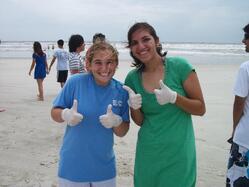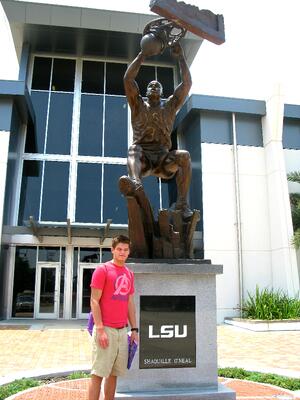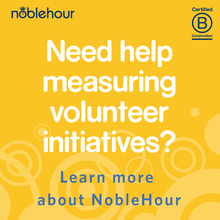All around the country, high school graduates are packing their overnight bags for college orientation. When I was a freshman, back in the dark ages, orientation took place just a few days before you began school. Universities now have new students choose from two or three day sessions beginning as early as March and continuing until the start of the Fall semester.
Orientation is not just for students! Parents are now encouraged to attend to learn about the university, as well as obtain a comfort level about sending their children away to school. Sessions address concerns about managing time, dining plans, housing and residence issues, academic advising, financial aid and money matters, safety, and being away from home.

“Orientation is important for students and parents, especially for freshmen,” said Lindsey Storey, director of orientation and events at Mississippi State University (MSU) in Starkville. “They’re coming out of high school and it’s hard for parents to let go. We want the students excited to come back in August and we want the parents to feel good and confident about sending their students to MSU. Our goal is to help parents and students transition to a new chapter in their lives.”
“I felt that orientation got me even more excited about college and I loved hearing about the experiences of the older college students,” said Kate Rosamond, an incoming freshman at Louisiana State University (LSU) in Baton Rouge.
“Every kid has something that they may be nervous about,” said Storey. “We want to alleviate that stress, fear, or doubt. For the student that is really excited, we want to reassure them they made the right decision.”
Orientation provides students a chance to get adjusted to the campus and learn their way around before it’s packed with undergraduate and graduate students. At some schools, students have the option of staying on campus to get a true higher education experience.
Orientation Leaders
Parents and students attend some general sessions together and then students are separated into smaller groups for more intimate Q&A sessions. Group leaders are college students and usually go through a rigorous interview process and training. At MSU, they are competitively selected from among a student body of 20,000. A concentrated course prepares them to lead tours, sessions, and answer questions.
During breakout sessions, students are taken around campus and may complete tasks like getting student ID’s, a campus mailbox, or signing up for the school’s recreation center. Orientation leaders also discuss college living, student involvement, the surrounding community, and student life in general.
“I learned a lot from the group leaders,” said Jeremy Siegel, an incoming freshman at MSU. “They stressed that in addition to academics and going to class, it was also really important to get involved and be a part of something at school.”
Orientation is also a great opportunity to meet future classmates. So when they return for move-in day in August, students can reconnect or at least recognize a few friendly faces.
Most orientations will offer sessions geared for specific majors. Academic officials will address expectations and requirements for particular areas of study. If the school has a band or other performing arts, your student may be able to try-out during orientation.
Class Schedule
One of the greatest benefits for students to attend orientation is the opportunity to schedule classes in advance. Rosamond agreed. “The most important thing I learned at orientation was how to schedule my classes.”
Counselors are on site to help students go through the registration process and answer any questions. Parents are usually not allowed into these sessions, so, if you’re like me and can’t help yourself, have a brief discussion about the following topics before they sign up for classes.
Think Before You Schedule!
1. Not an early bird? Don’t schedule classes at 8 a.m.
2. Don’t schedule classes 10 minutes apart if they are on opposite ends of the campus!
3. If your student wants to work part time, try to leave some blocks of time on the schedule for work and study time.
4. Look at required courses for their major. Are the classes offered during Fall and Spring semesters or only once a year? Take that into consideration.
5. Some courses require pre-requisite classes. Again, see if these are offered during both semesters.
Dining, Entertainment & Getting Involved
Whether it's breakfast, lunch, or dinner, at least one of your meals will be at a campus dining facility. This is a fun occasion for parents to see what their kids will be eating during the semester!
Evenings usually include informal dining and activities. This is a great way for parents and students to end the day and talk about what they each experienced. MSU holds their dinner in the stadium club of the Davis Wade Stadium. The evening festivities concluded with a movie shown on the scoreboard. Some schools have late night activities like carnival games and inflatable obstacle courses to get the kids to interact. Others may host informational fairs where students and parents can speak with representatives from a variety of university departments or student-led organizations and clubs to learn more about campus services, how to get involved in school, or how to volunteer within the community.
Q&A – Expert Advice
The last day usually includes a Q&A session with representatives from specific departments like housing, dining, financial aid, and health services. Some schools include panels of current university parents who can address the concerns new parents may have about sending their kids to school for the first time.
Dorm Life
Many schools offer dorm tours, so you can get a sneak peek at what you might need to bring on move-in day. If tours are not available, check the school’s housing website or their Facebook page for virtual tours of dorm rooms. Some schools and students post videos on YouTube as well.
Get the Picture?
For parents, especially those out-of-state, orientation is a comforting way to form a mental picture of where your student will be. As much as you may want to text or call throughout the day, it's time to cut the cord – or at least loosen it a little! Orientation makes it easier to do so.
“I am so glad that I went to orientation,” said Kate’s mom, Mary Frances Rosamond. “It answered a lot of questions for me and made me a lot more comfortable about sending Kate there. I also had a lot of fun.”
Kate felt the same way. “The sessions definitely made me feel more comfortable about entering college this year. I learned so much useful information about how to get ready for school.”
“Parents want their student to be happy,” said Storey. “When they see their kids excited, that gives them a good feeling. Parents should walk away feeling they are making a good investment, and that their children are going to be safe and happy.”
Photos: Mississippi State University, Matt Siegel


 "
" on campus. If your child is not one to appreciate your eager quest for knowledge, tell him or her to sit in the back and pretend they don’t know you. Many of your basic questions will probably be addressed in this presentation. However, I always had to raise my hand. I just couldn’t help myself. Whether it was about campus security, alcohol awareness, support for out-of-state students, or just some question that my son thought was totally lame, I needed answers to calm my parental anxiety. I think it was part of the process of letting go. I never let his embarrassment bother me. I embraced it.
on campus. If your child is not one to appreciate your eager quest for knowledge, tell him or her to sit in the back and pretend they don’t know you. Many of your basic questions will probably be addressed in this presentation. However, I always had to raise my hand. I just couldn’t help myself. Whether it was about campus security, alcohol awareness, support for out-of-state students, or just some question that my son thought was totally lame, I needed answers to calm my parental anxiety. I think it was part of the process of letting go. I never let his embarrassment bother me. I embraced it. Once the girls finished their interviews and had lunch, she told them it was time for them to explore - without her!
Once the girls finished their interviews and had lunch, she told them it was time for them to explore - without her! 
 determining schools to visit," said Deborah Kammerer, associate director recruitment & yield,
determining schools to visit," said Deborah Kammerer, associate director recruitment & yield,
 cities allowing flexible travel arrangements. They looked at cities with major airports, non-stop flights, or areas where they could visit more than one college in one trip. Also, if they had to fly, they committed to visiting at least two schools to make the trip more cost-effective.
cities allowing flexible travel arrangements. They looked at cities with major airports, non-stop flights, or areas where they could visit more than one college in one trip. Also, if they had to fly, they committed to visiting at least two schools to make the trip more cost-effective. said Kammerer. “It’s a great opportunity for admitted students to explore the campus and the variety of opportunities available.”
said Kammerer. “It’s a great opportunity for admitted students to explore the campus and the variety of opportunities available.”
 Springtime is around the corner. That means high school seniors are eagerly awaiting
Springtime is around the corner. That means high school seniors are eagerly awaiting



 In addition to researching service initiatives and community projects, students can find service-oriented schools by referencing The President’s Higher Education Community Service Honor Roll. The President’s Honor Roll recognizes colleges and universities with strong community connections that encourage students to pursue civic engagement and solve community problems. Schools that receive this award are encouraging their students to excel both in academics and in committing to meaningful service.
In addition to researching service initiatives and community projects, students can find service-oriented schools by referencing The President’s Higher Education Community Service Honor Roll. The President’s Honor Roll recognizes colleges and universities with strong community connections that encourage students to pursue civic engagement and solve community problems. Schools that receive this award are encouraging their students to excel both in academics and in committing to meaningful service.  Van Dyke said when he asks students why they want to pursue a specific major; they usually reply that they are good in that subject. For example, a student good in Math wants to study Engineering, but he may not look further than the obvious career path. They don’t think about all the different options for their particular set of skills. Many students just don’t want to do the research.
Van Dyke said when he asks students why they want to pursue a specific major; they usually reply that they are good in that subject. For example, a student good in Math wants to study Engineering, but he may not look further than the obvious career path. They don’t think about all the different options for their particular set of skills. Many students just don’t want to do the research. Allison’s volunteer work at the camp and throughout high school not only confirmed her desire to work in medicine, but also influenced her decision to become a pediatrician. A 2012 graduate of
Allison’s volunteer work at the camp and throughout high school not only confirmed her desire to work in medicine, but also influenced her decision to become a pediatrician. A 2012 graduate of  “Every year, since before I can remember, my mom brought me to help her at Krewe de Camp. When I was 8 years old, I met a girl named Katie who had Cerebral Palsy. She couldn't use her voice to speak so she used sign language. As soon as camp was over I asked my mom for some sign language books and dictionaries so I could learn how to communicate with Katie for the next summer. I can trace back my decision to go to RIT for interpreting to that day. I loved the feeling of being able to communicate with someone through a visual language and I wanted to be able to facilitate communication between people like Katie and other people who don't know her language.”
“Every year, since before I can remember, my mom brought me to help her at Krewe de Camp. When I was 8 years old, I met a girl named Katie who had Cerebral Palsy. She couldn't use her voice to speak so she used sign language. As soon as camp was over I asked my mom for some sign language books and dictionaries so I could learn how to communicate with Katie for the next summer. I can trace back my decision to go to RIT for interpreting to that day. I loved the feeling of being able to communicate with someone through a visual language and I wanted to be able to facilitate communication between people like Katie and other people who don't know her language.”  Walker thinks it’s never too soon to begin student volunteering in the community. “It can provide an easy and free way for students to get an idea about their potential career path.”
Walker thinks it’s never too soon to begin student volunteering in the community. “It can provide an easy and free way for students to get an idea about their potential career path.”  While extracurricular activities and leadership skills have always been a part of the admissions process, universities are now looking more closely at an applicant’s community engagement and student volunteering record. However, before your high schooler starts racking up miscellaneous hours for some magical number, keep in mind that today’s college admissions counselors aren’t just looking for quantitative data. They want to know why your student is doing service work.
While extracurricular activities and leadership skills have always been a part of the admissions process, universities are now looking more closely at an applicant’s community engagement and student volunteering record. However, before your high schooler starts racking up miscellaneous hours for some magical number, keep in mind that today’s college admissions counselors aren’t just looking for quantitative data. They want to know why your student is doing service work. Tydlaska adds that whatever type of student volunteering is chosen, it should be authentic. “If it’s not authentic, don’t pursue it. If your passion is sports, writing, music, etc. - pursue your talent in those areas.”
Tydlaska adds that whatever type of student volunteering is chosen, it should be authentic. “If it’s not authentic, don’t pursue it. If your passion is sports, writing, music, etc. - pursue your talent in those areas.”



